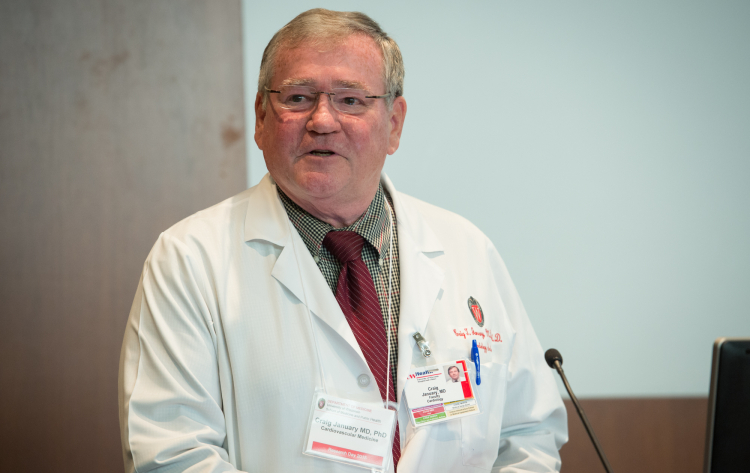Retirement honor: Craig January, MD, PhD

The UW Department of Medicine (DOM) is proud to honor Craig January, MD, PhD, professor, Cardiovascular Medicine, who will retire in October.
Dr. January joined the department in 1995, after receiving his MD and a PhD in physiology and biophysics from the University of Iowa and completing his internal medicine residency and a fellowship in cardiovascular medicine at the University of Chicago.
Learn more about Dr. January in the Q&A below.
What have been the most personally gratifying aspects of your work?
In one sentence, I have enjoyed particularly my roles here at University of Wisconsin (UW) as a clinician-scientist and in aspects of leadership. My lifelong interests, beginning at the University of Iowa and the University of Chicago, have focused on ion channels, cardiac arrhythmias, long QT syndrome and clinical electrophysiological disease presentations. The UW science environment was and remains a strong institutional attraction.
Perhaps the most gratifying experience is seeing medical science progress and seeing people evolve in their careers. It is so refreshing to see young people thrive.
What would you consider your most significant accomplishments?
As a scientist, I led the development of the Cellular and Molecular Arrhythmia Research Program (CMARP), which involves multiple current and previous cardiovascular medicine (CVM) faculty and research scientists. This program did not exist prior to my arriving here. My goal was to develop a CVM-based research group addressing translational science of ion channel/cardiac arrhythmia disorders. CMARP’s mission spans basic molecular science and stem cell biology to the clinical care and evaluation of patients and families with genetically based and acquired diseases. A number of commercial applications of CMARP-derived research products—managed by the Wisconsin Alumni Research Foundation (WARF)—is an offshoot that has benefitted DOM and UW. Linked to CMARP have been many UW undergrads, graduate students, and post-docs whose training and careers have been facilitated with their work experience in CMARP. In the early days we had one large, mutual office space to facilitate discussion and idea sharing. We all sat and worked together, and it was such fun!
Clinically, patient care has always been a central role of mine. My focus has been on ion channel/cardiac arrhythmia related diseases, in keeping with my translational science interests. Along with adult and pediatric CVM colleagues, this resulted in the development of the Inherited Arrhythmias/Cardiac Genetics Clinic. I will miss many of my long-term patients and families.
Other leadership roles include serving as CVM division chief, DOM Vice Chair for Research, and as Director of the Heart Station and its evolution supporting unified electrocardiographic needs for all of UW Hospitals and Clinics and UW Health. Program building has been very rewarding. It has also been exciting over many years to be on various review panels for the NIH, FDA, UW-ICTR and AHA including as chair of the current AHA/ACC/HRS atrial fibrillation guidelines.
What are you looking forward to in retirement?
I hope to spend more family time with Marilyn and to return to traveling. I plan to become an emeritus faculty, so I may still have some limited involvement in CVM activities and with my many UW/DOM friends.
Help preserve Dr. January's legacy
If you would like to help us honor Dr. January’s retirement and lifelong mission to uplift future healthcare leaders, please consider making a gift to the newly established Dr. Craig T. January Research Award fund.
Banner: Craig January, MD, PhD. Credit: Clint Thayer/Department of Medicine